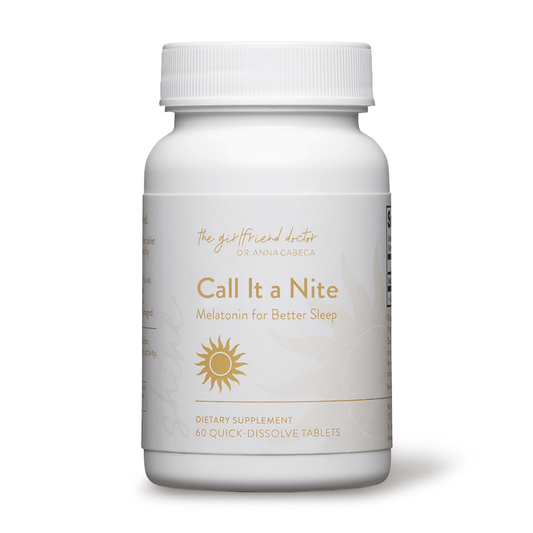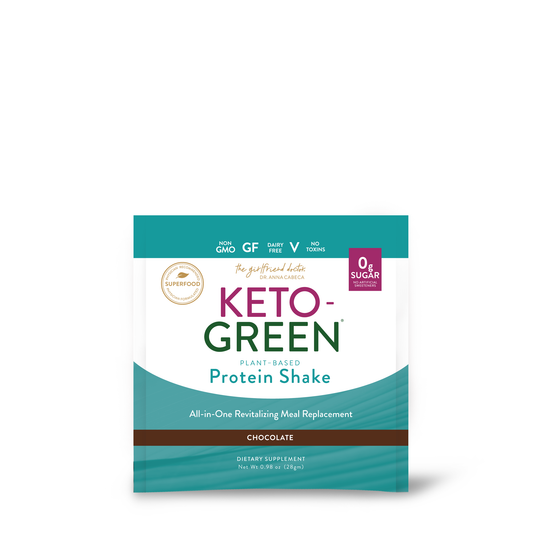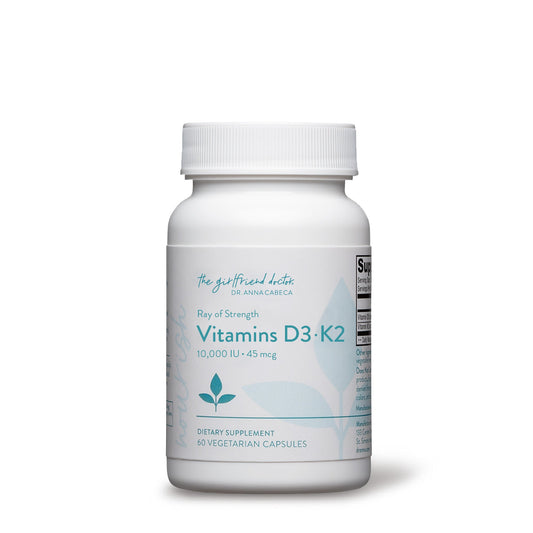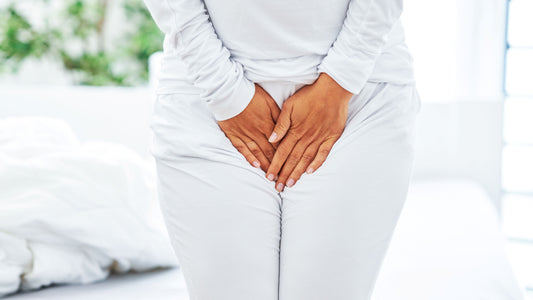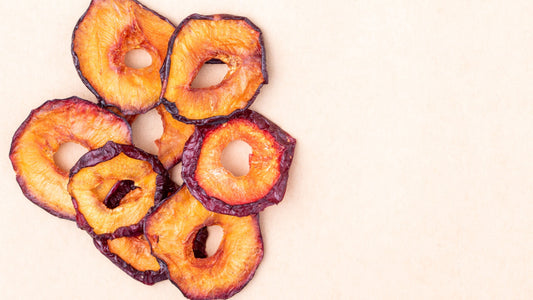I have been posting a lot of new information on my blog lately relating to women’s “sexual health”.
I had already suspected that many of the men who follow this blog were likely getting tired of hearing about all of this “lady parts” stuff (unless, of course, they were passing it along to the special women in their lives… which I always hope they do)... oh, and guys... I have an upcoming blog just for you so stay tuned...
But I hadn’t expected a particular message from a woman in our community. She told me something that caught me slightly off-guard.
She said,
“Dr. Anna...I’m not having sex anymore, so none of this ‘sexual health’ stuff matters to me.”
It really made me stop and think.
I do talk a lot about relationships, intimacy, connecting, and improving your libido – all relating to “sexual health”.
But sexual health does not just apply to relationships and sex.
So once again… love the questions that I receive from all of you… so let’s talk about it!
What if there isn’t a significant other? Is “sexual health” still important? (hint: YES!)
“Sexual Health” Is Not Just For People Having Sex
There are many reasons people stop having intimate relationships in their lives.
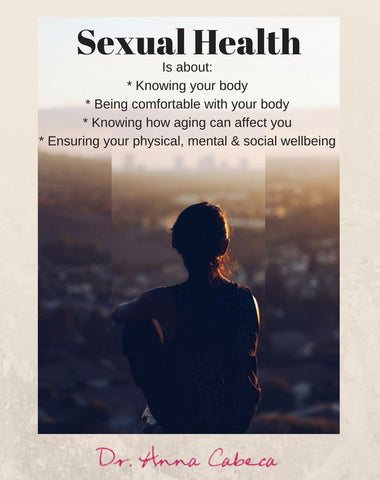
While I have had hundreds of patients and clients over my career that have enjoyed intimacy into their very late years (some into their late 80’s and even 90’s) I recognize that many people may just not be sexually active.
Some may still be experiencing the sadness over the passing of a partner, or may be “single again” after a divorce and not prepared to enter a new relationship.
Or women may have a health issue that just makes it too challenging to have a sexual relationship. Or maybe their husband has a health issue that affects intimacy.
Others may find fulfillment in interests, family, hobbies or other journeys. I know several women who have tapped into their spirituality late in their lives and find that provides their source of connection and energy.
So clearly there are a lot of people out there who aren’t having sex. Some who wish their lives were different, and many who are completely satisfied with their lives as is.
But for all of you let me be clear that “sexual health” is important for everyone.
In fact, most of what I’ve been talking about lately is just as important to people not having sex as those who are.
Let's Start With The Ladies Out There...
To me, sexual health is about you (as the unique, lovely woman you are), your relationships and your health. But even more so, it is about:
- Knowing your body (that includes your feminine parts "down there")
- Being comfortable with your body (that includes those lady parts as well!)
- Knowing how aging can affect you (so you can be preventative in living a pain-free and healthier life)
- Ensuring your physical, mental and social well-being
A healthy vagina makes for a healthier (and happier, pain-free) you. Seriously!
Whether you are sexually active or not, as you age (due to the hormone changes we’ve discussed in other blogs) your vagina and vulva (If you don't know where your vulva is, please watch this short video!) change.
It’s a very natural part of aging. Your vagina does get dry, and starts to shrink and lose its elasticity.
Yes, this means more painful intercourse… but even outside of intercourse it can cause health issues and discomfort:
- Vaginal dryness, if left unchecked, can contribute to more urinary tract infections
- Lack of sex, believe it or not, can create MORE dryness! Regular sex and vulvovaginal massage helps improve blood circulation in the vagina which helps counter dryness! It’s a vicious circle. So if you aren't having sex you need to add moisture!
- Vaginal and vulva dryness can result in pain outside of sexual intercourse, even during your gynecological exam and/or Pap smear. I’ve had patients who have discomfort wiping due to the thinness and sensitivity of their vulva and surrounding tissue. Bike-riding, horseback riding, even walking can be downright uncomfortable, even downright painful.
- Incontinence and urgency symptoms are also increased as we get older, and paying attention to rejuvenation of our "lady bits" deserves attention.
So these are issues that should be attended to regardless of whether you currently have a partner, or even if you are not planning on having another partner.
Check out my article on vulvar-vaginal atrophy, this includes dryness, irritation and pain, urinary incontinence and prolapse, as symptoms… and provides comparison information on different treatment options such as lubricants and moisturizers to address dryness. And note that my new feminine restorative cream for the vulva, Julva, is a wonderful and safe option that addresses these issues...and much more. Again, these issues need to be addressed even if you aren't having sex.
Also, think about what you are putting on this area! Many products that we use are loaded with chemicals and irritants (Bubble bath! Soap! Certain OTC lubricants!)…do your homework and keep an eye out for ingredients that “touch” your sensitive lady parts.
And finally, if you are on prescription medications ask your doctor or pharmacist if any of them have known side effects for vaginal dryness.
QUIZ TIME! Take my Eve Questionnaire to understand your sexual health status.
Take my Eve Questionnaire. In 2 minutes flat, you’ll get a score (from 0 to 70 – where lower is better) that represents an assessment of your sexual and pelvic health. Once you know your starting number, it’s much easier to improve. Don’t you want to know if you are aging gracefully from a gynecologist’s perspective?
A Healthy Pelvic Floor Can Keep You Out Of Diapers
The number one reason elderly women end up in nursing homes has been attributed to incontinence issues.
OK, I know you are likely not ready for a nursing home (you may just feel like it some days), but I’m trying to make a point.
Your “sexual health” includes a healthy pelvic floor, which is one of the many things I’ve been talking about a lot lately!
There are many reasons for incontinence as well as many different types of incontinence. But the bottom line to help correct these issues is a healthier pelvic floor.
And might I add that prevention is a better approach than hearing your doctor someday recommending surgery!
For many women – especially over 50 - it is likely that your pelvic floor muscles are on the weaker side. It is a natural part of aging, and also thought to be impacted by childbearing.
So for many of you, Kegel exercises, as one example, are key to strengthening your pelvic floor.
Again, this is not just important for enjoying sexual intercourse!
To Kegel Or Not To Kegel
Many women do not do any type of pelvic floor exercise. Oh, say this isn't true!
And those that do? Many do Kegel exercises incorrectly which can actually make matters worse.
Check out my video on how to do Kegel exercises correctly. Or just ask your gynecologist the next time you see him/her! And ask them to assess your pelvic floor health and muscle strength while they are evaluating “down there”!
A small number of women may not need to focus on Kegel exercises as they may have the opposite issue of pelvic floor muscle weakness; they may have tense or hyperactive muscles.
Some women who are already suffering from prolapse (this is when a woman’s uterus, urethra, bladder, rectum, small bowel or vagina itself begins to fall out of their normal positions) may actually be routinely tensing their muscles to “keep things from falling”…These women need to actually learn to relax their pelvic floor muscles before doing any strengthening exercises.
The same goes for many women suffering from vaginismus (where the vagina contracts when it is being penetrated resulting in pain), where their musculature is tense and/or hyperactive. Again, these issues need to be dealt with by having affected women learn to relax their pelvic floor muscles.
There is a great relaxation movement called the “Pelvic drop” that physical therapists use for this issue (the pelvic drop is also used for a hip related issue called hip drop that runners get). You can find exercises for the pelvic drop and other pelvic floor relaxation techniques online.
So How Do You Know If YOU should Kegel Or Not?
In my experience, most women have weakened muscles after age 40. I routinely told my clients from pregnancy onward to regularly exercise their pelvic floor. So many of us exercise but have forgotten about these beautiful and oh so important muscles. You can test your muscle strength yourself as I teach in my video. To be sure ask your gynecologist during your annual exam! This is the type of discussion you should already be having with your doctor!
A self-test you can do is to try and stop your urine midstream when you are peeing.
If you can’t stop your urine stream, your pelvic floor muscles are likely not as strong as they should be. Note that this isn’t a test you should repeat too often (and definitely don’t do this as an exercise routine!) as it can work against your muscle control. Just do it to initially self-test yourself…and maybe repeat in a month if you implement Kegels. And then infrequently after that.
Other Exercises You Can Do To Strengthen Your Pelvic Floor
I interviewed Dr. Brianne Grogan on my Couch Talk podcast a while back about the exercises that can be done to naturally support your pelvic floor.
She gave us several great pelvic floor exercise suggestions during our chat. First is to simply keep moving every day! She suggests walking as a great daily exercise. Posture is important as you want to exercise muscles most effectively in the correct position.
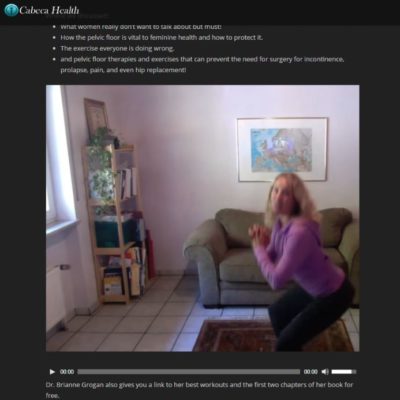
Another easy exercise? Hip circles.
You stand and keep your shoulders still while rotating just your hips (kind of like a hula dancer). Imagine you are drawing a circle on the floor with your hips. Draw a small circle and then a larger one. This activates the lower area of your core which strengthens all of the muscles in that area. It is kind of fun to do as well! Brianne felt it was safe and fun for women regardless of whether they have a weak or tense pelvic floor muscle.
Brianne also talked about a hip-activator exercise that she learned in her yoga training.... good for anyone.
She (and other pelvic floor experts I have had the pleasure of working with or talking to) feel yoga is a great form of "therapy" to keep your hips, pelvic floor and core healthy.
If you'd like to hear more from Brianne, check out her book, "Lady Bits", on Amazon. She also has a lot of good exercise videos on YouTube and her website...
Another great podcast that is available on my site is with Dr. Betsy Greenleaf, where we talk about prescription medications that are out on the market, hormone therapies, laser and surgeries. Just a wealth of information, "When Pelvic Floor Exercises Aren't Enough to Deal With Incontinence."
Pelvic Floor Physical Therapy – What Is It? Do You Need It?
Given that so many women are suffering from incontinence issues, vaginal pain, endometriosis, pelvic floor issues and hip problems I think more and more women will be getting a prescription from their gynecologist, urologist or other doctors for pelvic floor physical therapy.
This therapy consists of using biofeedback to measure and encourage both relaxation and strengthening of the pelvic floor muscles. Exercises are utilized to improve muscle tone as well as improve the ability to relax tense muscles. Massage may also be used (called myofascial release). Yoga and another functional movement may be incorporated.
If you decide to see a physical therapist to evaluate pelvic floor dysfunction, there are a couple of options to consider. I suggest you also discuss with your doctor to find the best solution for you and your particular symptoms (some focus more on incontinence versus pelvic pain, for example).
CAPP-PT: You want to make sure you find someone who at a minimum has a CAPP-PT certificate of completion, that is the Certificate of Achievement in Pelvic Physical Therapy (CAPP). This means that the physical therapist has completed entry level pelvic rehabilitation courses through the APTA (American Physical Therapy Association), and has met the practical, written exam and submission of a case study related to pelvic health dysfunction. Note that this achievement does not require training hours in a clinical practice.
Qualified pelvic rehabilitation therapists and certified therapists: These are therapists who have completed residencies, or who have chosen to pursue post professional training. These individuals may have additional qualifications to treat patients with pelvic disorders. Herman and Wallace Pelvic Rehabilitation Institute is one example; they provide a PRPC certification (Pelvic Rehabilitation Practitioner Certification) which requires 2000 hours of direct patient care before sitting for the exam. Another example is the WCS (APTA SOWH). There are directories of certified therapists on both of these organizations' websites. Note that many areas of the U.S and the world are unrepresented by such certified specialists (while you may still be able to find qualified pelvic rehab therapists).
A Healthy Pelvic Floor Starts With A Healthy Digestive System
What? Why does your tummy have anything to do with incontinence, prolapse or other pelvic floor issues?
The reason is three-fold:
1. Food intolerances/stress/unhealthy digestion/being overweight/pelvic health issues are intertwined
First, too many of us have inflammation due to food intolerances, especially relating to dairy and gluten. The inflammation that is caused by this is very pervasive and creates inflammatory responses throughout the body, including the pelvic area.
A good friend of mine who is also a pelvic health expert, Jessica Drummond, MPT, CCN, CHC,has found that her pelvic pain patients often have constipation, Irritable Bowel Syndrome (IBS), Small Intestine Bacterial Overgrowth (SIBO) or Celiac Disease.
Think about it…when you have these types of digestive issues, you are straining or chronically clenching; imagine how that affects your pelvic floor muscles.
That is why Jessica often has her pelvic pain patients go on an elimination diet to see which inflammatory foods may be triggers of pelvic pain symptoms. She also believes strongly that nutrition plays a role in pelvic health issues and she seeks to optimize nutrition for her clients in order to help support healing.

I believe that a good probiotic is a great line of defense against digestive issues and inflammation in the body (including inflammation relating to our sexual health).
And eating a Keto-Green diet is important as well.
Stress is also a huge impact to digestive health.
While I won’t talk about it here, I’ve written many previous blogs on the topic of stress and how stress impacts your health as well as your relationship (should you be in one)!
Stress management is really important. When you are stressed you may be tensing your muscles, you can become constipated and inflamed.
2. If you can’t poop in a healthy manner, you are going to strain your pelvic muscles
A lot of people have problems pooping.
It may sound funny or yucky, but it is true…and it isn’t funny at all. So fiber and eating a healthy diet with a lot of greens is important. Reducing stress, staying hydrated... making sure you have enough exercise/movement in your life... all important. Take probiotics and digestive enzymes if you find you need help. Don’t strain when you poop and don’t strain or push to get that last bit of urine out either.
And all things supporting your digestive system are important in protecting your pelvic health!
While there isn’t a lot of research on it, many in the holistic space are advocating squatting can help create a more natural elimination “alignment” as well. There are products out on the market that look like step stools, to help with this.
Sitting is the new “smoking” in terms of health impacts
And while we're talking about sitting on the toilet, let me also just add one other comment about the health dangers of sitting too much!
Sitting too much is bad for your pelvic health as well as for many other aspects of your health. If you sit a lot while working, try a stand-up desk...or even better, a treadmill desk. Or if you can’t get one of those, just take frequent breaks. Stand and stretch (do some hip circles!), or better, go for a walk outside and get your vitamin D at the same time.
3. Being overweight can make pelvic health issues worse
Research has shown that being overweight adds pressure, and downward pressure makes pelvic conditions even worse. Having diabetes or high blood pressure, or other underlying diseases, can also make for more issues. So get focused on the excess weight.
Next time, we’ll talk to the guys out there… what do THEY need to support their sexual health?
And as always, let me know if you have questions at: team@drannacabeca.com
